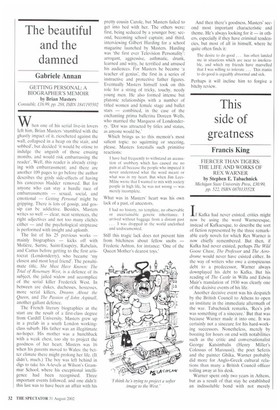The beautiful and the damned
Gabriele Annan
GETTING PERSONAL: A BIOGRAPHER'S MEMOIR by Brian Masters Constable,176.99, pp. 288, ISBN 1841195502 When one of his serial live-in lovers left him, Brian Masters 'stumbled with the ghastly impact of it, ricocheted against the wall, collapsed in a heap on the stair, and sobbed', but decided 'it would be otiose to indulge the anguish of those ensuing months, and would risk embarrassing the reader'. Well, this reader is already cringing with embarrassment; and there are another 109 pages to go before the author describes the grisly side-effects of having his cancerous bladder removed. But for anyone who can stay a hurdle race of embarrassments — sexual, social, and emotional — Getting Personal might be gripping. There is lots of gossip, and gossip can be addictive. Besides, Masters writes so well — clear, neat sentences, the right adjectives and not too many clichés either — and the psychological striptease is performed with insight and aplomb.
The list of his 25 previous works — mainly biographies — kicks off with Mohere, Sartre, Saint-Exupery, Rabelais, and Camus before getting to the first aristocrat (Londonderry), who became 'my closest and most loyal friend'. The penultimate title, She Must Have Known: The Trial of Rosemary West, is a defence of its subject, the jailed widow and accomplice of the serial killer Frederick West. In between are dukes, duchesses, hostesses, more serial killers, Dreams About the Queen, and The Passion of John Aspinall, another gallant defence.
The French literary biographies at the start are the result of a first-class degree from Cardiff University. Masters grew up in a prefab in a south London workingclass suburb. His father was an illegitimate no-hoper. His mother was a hunchback with a weak chest, too shy to project the goodness of her heart. Masters was 16 when his parents moved to Wales: the better climate there might prolong her life. (It didn't, much.) The boy was left behind in digs to take his A-levels at Wilson's Grammar School, where his exceptional intelligence had been recognised, Three important events followed, and one didn't: this last was to have been an affair with his
pretty cousin Carole, but Masters failed to get into bed with her. The others were: first, being seduced by a younger boy; second, becoming school captain; and third, interviewing Gilbert Harding for a school magazine launched by Masters. Harding was .the first ever Television Personality': arrogant, aggressive, asthmatic, drunk, learned and witty, he terrified and amused his audiences. For Masters he became 'a teacher of genius', the first in a series of instructive and protective father figures. Eventually Masters himself took on this role for a string of tricky, touchy, needy young men. He also formed intense but platonic relationships with a number of titled women and female stage and ballet stars — combined, in the case of the enchanting prima ballerina Doreen Wells, who married the Marquess of Londonderry. 'Dor was attracted by titles and status, as anyone would be.'
Which brings us to this memoir's most salient topic: no squirming or sneering, please. Masters forestalls such primitive reactions:
I have had frequently to withstand an accusation of snobbery which has caused me no pain at all because the people who imputed it never understood what the word meant or what was in my heart. But when Jim LeesMilne wrote that I wanted to mix with society people in high life, he was not wrong — was merely incomplete.
What was in Masters' heart was his own lack of a past, of ancestors.
I had no history, no template, no observable or ascertainable genetic inheritance. I arrived without baggage from a distant past ... I was dropped in the world unclothed and undocumented.
Still this tragic lack does not prevent him from bitchiness about fellow snobs — Frederic Ashton, for instance: 'One of the Queen Mother's dearest toys.' And then there's goodness, Masters' second most important characteristic and theme. He's always looking for it — in others, especially if they have criminal tendencies, but most of all in himself, where he quite often finds it:
The desire to do good ... has often landed me in situations which are near to intolerable, and which my friends have marvelled that I was willing to tolerate ... This mania to do good is arguably abnormal and sick.
Perhaps it will incline him to forgive a bitchy review.


























































 Previous page
Previous page